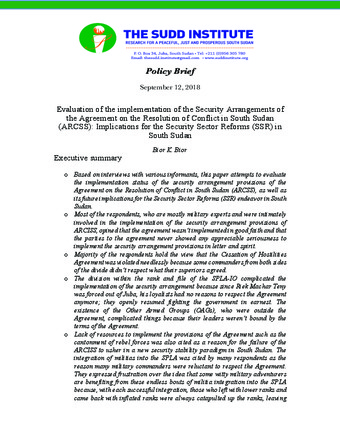Evaluation of the implementation of the Security Arrangements of the Agreement on the Resolution of Conflict in South Sudan (ARCSS): Implications for the Security Sector Reforms (SSR) in South Sudan
Publication Summary
- Based on interviews with various informants, this paper attempts to evaluate the implementation status of the security arrangement provisions of the Agreement on the Resolution of Conflict in South Sudan (ARCSS), as well as its future implications for the Security Sector Reforms (SSR) endeavor in South Sudan.
- Most of the respondents, who are mostly military experts and were intimately involved in the implementation of the security arrangement provisions of ARCISS, opined that the agreement wasn’t implemented in good faith and that the parties to the agreement never showed any appreciable seriousness to implement the security arrangement provisions in letter and spirit.
- Majority of the respondents hold the view that the Cessation of Hostilities Agreement was violated needlessly because some commanders from both sides of the divide didn’t respect what their superiors agreed.
- The division within the rank and file of the SPLA-IO complicated the implementation of the security arrangement because since Riek Machar Teny was forced out of Juba, his loyalists had no reasons to respect the Agreement anymore; they openly resumed fighting the government in earnest. The existence of the Other Armed Groups (OAGs), who were outside the Agreement, complicated things because their leaders weren’t bound by the terms of the Agreement.
- Lack of resources to implement the provisions of the Agreement such as the cantonment of rebel forces was also cited as a reason for the failure of the ARCISS to usher in a new security stability paradigm in South Sudan. The integration of militias into the SPLA was cited by many respondents as the reason many military commanders were reluctant to respect the Agreement. They expressed frustration over the idea that some witty military adventurers are benefiting from these endless bouts of militia integration into the SPLA because, with each successful integration, those who left with lower ranks and came back with inflated ranks were always catapulted up the ranks, leaving their most senior colleagues at the lower echelons of military establishment. This made for an army in which officers did not regard the chain of command.
- The paper concludes with the following recommendations: (1) South Sudan will stand a good chance of restructuring and reforming its security sector if the security arrangements of any future peace accord (s) are implemented in letter and spirit; (2) Instead of forever going through unsuccessful bouts of militias integration, there is a need for South Sudan to institute a security sector that is reflective of all her ethnic diversities to ensure that everyone’s fears are addressed; and (3) There is a need to shrink the size of South Sudan army so that the resources that are now being burnt up in its maintenance are shifted to the chronically neglected social services provision sectors such as health and education.
Bior K. Bior is a Visiting Fellow (VF) at the Sudd Institute, with a broad research interest in Communal Security Dilemma, inter- and intra-tribal relations and Political Sociology in South Sudan. He holds a Bachelor’s degree in Biological Sciences (B.S.) and a Minor in Sociology from the University of Vermont (UVM), as well as a PhD in Cells and Molecular Biology/Neuroscience from the same institution.

